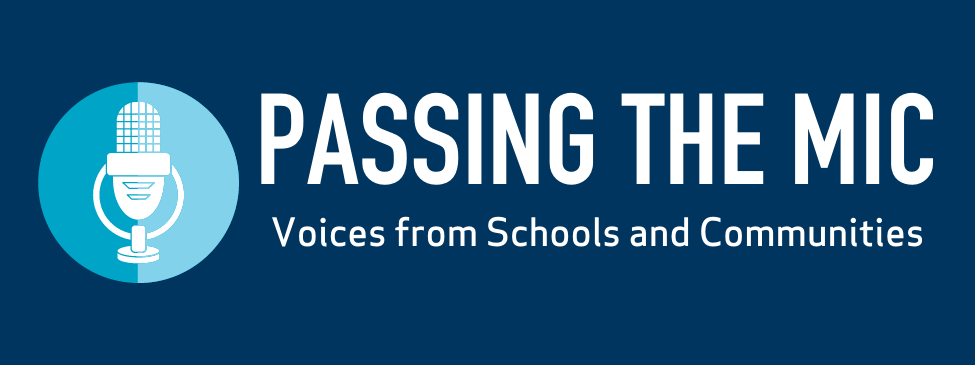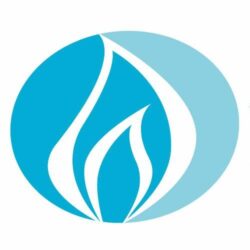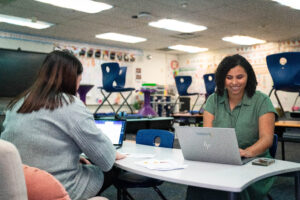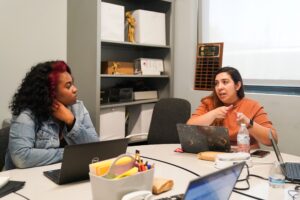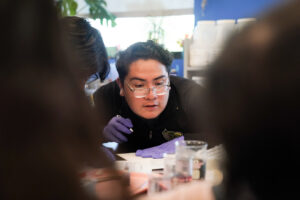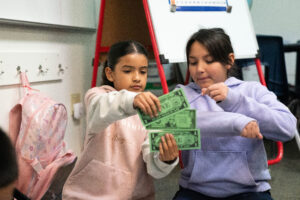Our new video series, Passing the Mic, features candid conversations with education leaders from across the country about what’s working, what’s not, and what we still don’t know about ensuring students get the educational opportunities they deserve during this uniquely challenging moment.
In Episode 3, TNTP’s CEO Dan Weisberg interviews Jason Kamras, superintendent of Richmond Public Schools and former National Teacher of the Year, about his journey from the classroom to the superintendent’s chair, leading during the COVID-19 pandemic, and what the condition of school bathrooms reveals about equity. You can watch the entire conversation above or here, and read excerpts below.
You can find previous episodes of Passing the Mic here.
When you’re having conversations with teachers at RPS, how do you bring forward the fact that you did walk a mile in their shoes?
Well, it’s interesting, the minute you leave the classroom, you lose most of your teacher street cred even as a National Teacher of the Year. But I guess what I would say, something I learned from Kaya Henderson, the former chancellor in DC, is there’s probably nothing more powerful when it comes to leadership than empathy. Just understanding where people are coming from. Doesn’t mean you’re agreeing with them. It’s truly trying to understand people as human beings. And so my time as a teacher has enabled me to be truly empathetic to the realities of what’s going on in school. Teaching again, even for that 30 minutes a day during the closure, was like an empathy booster shot. And it just really helps inform my thinking as I make decisions every single day.
How did you approach creating connections with parents and with students and families when you became superintendent?
I thought about it in two ways. What is it that I wanted the community to know about me? And what did I really want to know from the community? On the first, I really wanted the community to know that in my heart, I’m a teacher. I’ve always been a teacher. And so I talked a lot about my students, and what it was like to be a teacher in southeast DC, which is very similar to Richmond. I also wanted them to know that the trappings of being a superintendent, they’re not what makes me tick. People were surprised when I didn’t show up with an entourage. It was literally just me when I came to a school. I asked people to call me Jason. I wanted folks to know that I really am interested in having a relationship with you, and connecting and hearing what’s on your mind. And then I also really tried to share that, look, I’m going to be straight with you. But that means I’m sometimes going to have to tell you things you don’t want to hear.
The second piece of this was wanting to hear from the community, and I visited every single school in my first 100 days. Did dozens of community meetings, did home visits all across the city to sit with families in their living rooms. But I kept this running mental list of all the things people wanted to be better or different or that they wanted to keep. But on the things that needed to get better, there’s a price tag to just about all of them. And when I started sharing with teachers in particular it was like, “Look, my mental list is now at about $1 billion. And man, I wish could give it to you all tomorrow, but I can’t. And so we’re going to just have to have some really hard conversations about what do we do first and what do we prioritize?”
I think a lot of folks are scared to be honest. But it is the quickest path to building trust. That and being vulnerable. I will tell teachers sometimes, “I don’t know. I’m not sure how to solve this.” And people are usually pretty stunned because you’re expected to have all the answers. But if this stuff were easy, it would have been solved already a long time ago.
What are some things you heard that you never would have read in, say, a briefing paper from your staff?
If you had asked me the day before I took the job, name the top three things you’re going to work on, none of those top three things are what I actually ended up working on. And not because everything was on fire, but because if you go to talk to people you actually have to listen. And what came up, particularly among kids and staff, was the bathrooms. So during school visits, when the kids were gone, I would go and see what was going on. And it was horrible. Bathrooms with no working sinks, with no stalls with doors, no paper towels, no toilet paper, no soap, crumbling ceilings. Unconscionable. And very early on, I remember I tweeted a picture of one of our bathrooms and I said, “If you wouldn’t send your own kid to a school like this, why should anybody?” And boy did I take a lot of heat for that.
But that was 100% the right thing to do. Because no child should have to literally hold it because they wouldn’t want to use the bathroom. When we think about just basic dignity and respect, that was essential. That is a very concrete example that I never would have thought of, that you’re never going to learn in a superintendent class or whatever. So we did a “bathroom blitz,” but listen, it’s still ongoing. We still have work to do. But we now have bathrooms that are not only fixed, but have beautiful murals in them of local civil rights icons and beautiful quotes.
At some point I saw a quote from you to the effect of, “If this were an all-white district, our bathrooms wouldn’t look like this.”
It’s just the truth. This is an extraordinary city and I’m proud to call it my home. But we have a very dark history. 400 years of institutionalized racism. Richmond was the capital within America’s enslaved African trade. And we live with that legacy today. There is a direct line from 1619 when the first enslaved African was brought to Virginia, to those bathrooms being unconscionably broken in 2019. And all I need to do is drive 15 minutes in any direction where the school systems are largely white, and you will not find a bathroom that looks like one of ours. And that’s just a reflection of the decades of disinvestment that have happened in Richmond, in countless other cities, that, when desegregation or integration happened, and most white families left those city cores, investment in the infrastructure of so many different kinds bottomed out. Not only that, but rich, wonderful, thriving African American communities were intentionally destroyed with highways and other infrastructure projects to support the white flight to suburbia.
I think there are countless ways in which we still live with that legacy. I think the events of the last several weeks have brought that to many folks’ attention, and it’s going to take us a long time to collectively dig ourselves out of it.
The majority of the kids and families you serve are African American. And your students are in the protests and marches in the wake of George Floyd’s murder, and probably at the front of them. How do you think about your role in that situation?
Well, I went out there and was protesting with them. I have been told I am a political superintendent. Now, sometimes that’s a compliment and sometimes it’s not. Depends on who you’re talking to. I share that because I think part of the job is changing the structure in which we’re working, right? If being a superintendent is just managing the day-to-day of school and not changing the society in which school exists, I don’t want the job. As much as I love that first part, I think the second part is indispensable because, look, if all I do is get kids to read and do math, well, I failed. I think it’s my responsibility to help them be prepared to make a better world. If I’m not doing that myself, what am I doing? I think it’s almost a dereliction of duty if you don’t lean into these important moments that really shaped everything that we do.
This, of course, comes on top of another crisis, COVID-19. How are you guiding the decisions that RPS is making, that your team is making What are the things you’re prioritizing looking ahead to next school year?
Three words come to mind: equity, simplicity, and grace. Equity to me means that the kids who need the most get the most. Our number one priority was to make sure our kids who needed it got food. Lots of kids rely on meals at school, so we very quickly mobilized to set up 56 locations across the city and also mobile sites using our buses to deliver meals. We’ve crossed the 1 million meal mark. The second priority was getting computers and internet access to any child in Richmond who didn’t have them. And shame on us for not having dealt with that before. But we did. And in a matter of two months, we raised over a million dollars in philanthropy and reallocated another couple of million from within our budget, and purchased and configured about 15,000 Chromebooks and about 6,000 wifi hotspots. And as we think about reopening, as a matter of equity are shooting to have five days a week in-person, physically distanced, for any student with a significant needs in their IEP, English learners, homeless children, and a couple of other categories.
Second is simplicity. I’m a huge believer in simple responses have the best chance of working. And so really trying Even, for example, our mask policy. Folks are like, “Well, maybe you need a mask in this case, but in this case you don’t.” I was like, screw it, everyone’s going to wear a mask all the time. We can put that on a bumper sticker and be done with it.
And then last is grace. Everyone is stretched beyond imagination, and we are literally creating a new school system on the fly. And, none of us is our best selves in this moment. Trying to treat myself and my team and others with grace and just acknowledge, even if everything went perfectly for the school opening down, it won’t be enough for kids. That is terrifying, because the long-term impact of this is going to be huge. And we’re already thinking about extended-year and year-round schedules down the road to make up for it. But also recognizing that everyone’s working hard and doing the very best they can for kids. Kaya [Henderson, former DC Public Schools chancellor] used to say, all we are is a group of big people trying to help a group of little people, and if the big people aren’t healthy, the little people won’t be, so we’ve got to take care of each other as we figure this all out.
